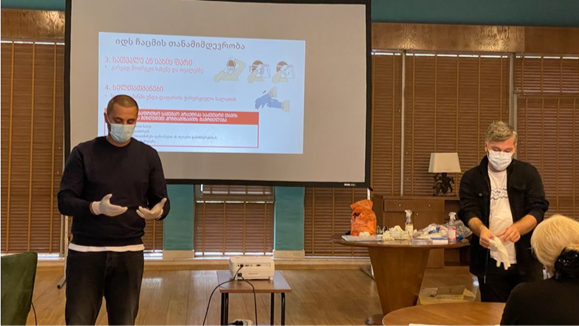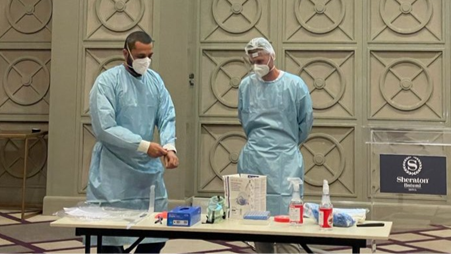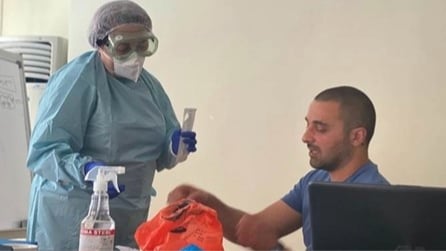At a glance
- In the country of Georgia, efforts to enhance national emergency response capacity include establishing the Public Health Rapid Response Team (RRT) Program, prompting CDC to conduct training to lay the groundwork for its implementation.
- The RRT program played a crucial role in managing COVID-19 outbreaks, enhancing testing and vaccination rates, while ongoing CDC support strengthens Georgia's response capabilities.
- CDC's efforts ensure a sustainable and effective RRT program to address present and future public health threats.
Strengthening Emergency Response through Georgia NCDC's Rapid Response Teams

More than two years into the COVID-19 response, the Georgia National Center for Disease Control and Public Health (NCDC) continues to make great strides in strengthening national emergency response capacity through the establishment of the Public Health Rapid Response Team (RRT) Program in the Eastern European country. Public health RRTs are multidisciplinary teams trained and equipped to rapidly deploy specialists to respond to a public health emergency. RRTs can be used throughout all stages of an emergency response. In addition to strengthening capacity to respond to emergencies such as COVID-19, RRTs can also serve as a resource for non-emergency public health activities, including public health campaigns and interventions that require additional trained workforce support. These efforts directly support the country's capability to respond to the current pandemic, safeguard against future public health emergencies, and serve as a model for strengthening emergency management structures in the region.
CDC's Impact on Rapid Response Training
In December 2020, CDC's Emergency Response Capacity Team (ERCT) from the Emergency Response and Recovery Branch in the Division of Global Health Protection conducted an RRT management workshop. This training covered the design, establishment, and maintenance of a sustainable, effective public health RRT program in the country of Georgia. Over several days, ERCT delivered tailored online training to 14 NCDC public health specialists, generating relevant RRT-related plans, processes, and procedures for public health emergencies, laying the foundation for Georgia's public health RRT program. This group of multidisciplinary public health specialists now make up the RRT management team at the central level of Georgia's government, conducting training and leading responses across the country.
The national RRT Management Team developed and implemented a four-day hands-on, multisectoral COVID-19 RRT just-in-time training in March 2021 for responders at the central level in Georgia. Just-in-time training tailors existing materials to a specific public health event to teach RRTs what they need to know prior to deployment. CDC's ERCT was able to facilitate this collaboration and provide mentorship between CDC and Georgia's NCDC experts to adapt existing COVID-19 RRT training materials to the Georgian context. Between May 2021 and September 2022, 96 health specialists took the COVID-19 RRT just-in-time training and used what they learned in all nine regions of Georgia.

Kakheti RRT Enhancing COVID-19 Response and Preparedness
The COVID-19 pandemic has highlighted the importance of dedicated personnel who can focus on emergency management and operations to ensure RRTs are functional and can be deployed when needed. In December 2021, the Kakheti RRT activated to strengthen COVID-19 response management, improve testing capacity, and increase vaccination rates. During a field visit, RRT members observed the impact of the COVID-19 pandemic on the local healthcare system and community.
With support from the local municipality, the team was able to conduct an assessment and provide recommendations to improve coordination between a local clinic and the Public Health Center (PHC) and provide training for biosafety and infectious disease control.
The Future of Rapid Response Teams in Georgia
In February 2022, Georgia experienced its fourth wave of the COVID-19 outbreak, with the Omicron variant causing an increase in cases. Consistent planning, training, and skill-building of public health leaders will continue to help the country respond to outbreaks like COVID-19 effectively.

Throughout 2022, CDC ERCT and the CDC Georgia Country Office will continue to support public health response capabilities in Georgia. This partnership will improve upon recent efforts by supporting the application of lessons learned from recent RRT deployments, ensuring seamless integration of Georgia's public health Emergency Operations Center (EOC), and advising NCDC on RRT roster development. Increased support will include additional RRT training programs, such as an all-hazards RRT and other activities supportive of building an effective and sustainable RRT program across Georgia.
CDC ERCT's phased approach to capacity building can help create a sustainable public health RRT program by developing a cadre of public health professionals who are ready to respond rapidly to public health emergencies. Current and future collaborations between US CDC and NCDC will work to strengthen Global Health Security and Georgia's capacity to prevent, detect, and respond to current and emerging threats in the region.
